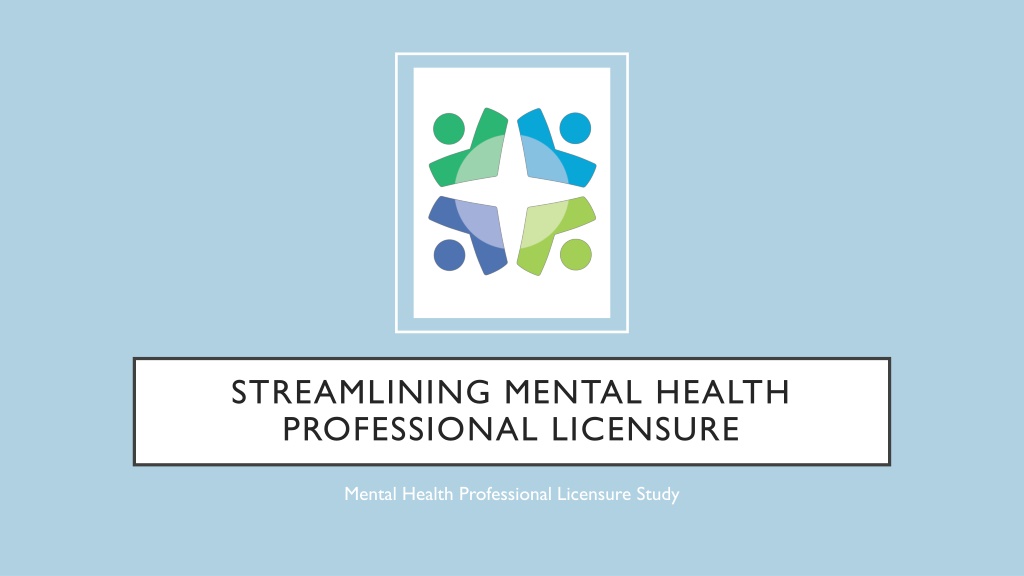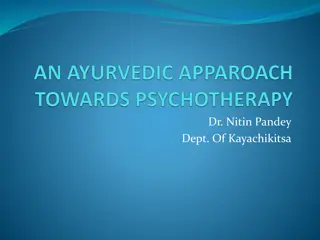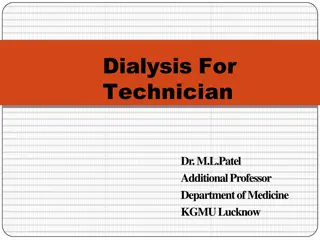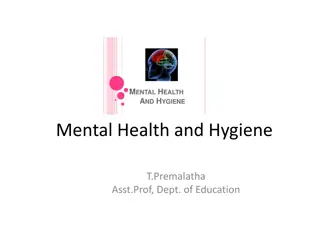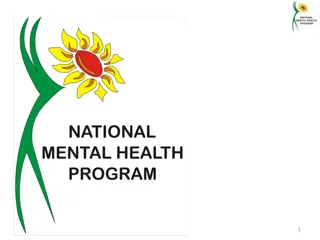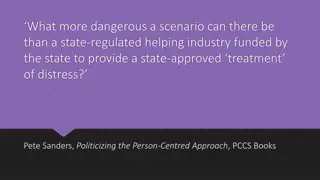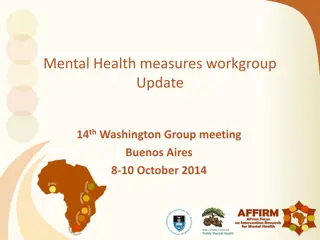Understanding Regulated Mental Health Services and Practice Modalities
Explore the nuances of regulated mental health services (RMHS) and practice modalities within the mental health professions. Delve into the distinct scopes of practice and qualification criteria of various mental health professions, such as Applied Behavior Analysis, Marriage and Family Therapy, and Psychoanalysis. Understand the significance of streamlining mental health professional licensure and the potential benefits and costs associated with such initiatives.
- Mental Health Professions
- Regulated Services
- Practice Modalities
- Streamlining Licensure
- Qualification Criteria
Download Presentation

Please find below an Image/Link to download the presentation.
The content on the website is provided AS IS for your information and personal use only. It may not be sold, licensed, or shared on other websites without obtaining consent from the author. Download presentation by click this link. If you encounter any issues during the download, it is possible that the publisher has removed the file from their server.
E N D
Presentation Transcript
STREAMLINING MENTAL HEALTH PROFESSIONAL LICENSURE Mental Health Professional Licensure Study
Profession Professional Service DEFINITIONS Scope of Practice Standard of Practice
How are the services provided by mental health professions distinct? REGULATED MENTAL HEALTH SERVICES How are each profession s entry qualifications criteria different? Is the variation in qualification criteria justified by unique services?
1. Which regulated mental health services (RMHS) are included in this study? 2. How are the RMHS different? STREAMLINING CORE CONSIDERATIONS 3. What does streamlining the regulation of mental health services mean? 4. What are the potential benefits from streamlining RMHS? 5. What are the potential costs from streamlining RMHS?
REGULATED MENTAL HEALTH SERVICE ADC - 21 PSYA - 42 MASW - 86 MFT - 121 MA Psych - 202 ABA - 245 A RMHS is any mental health service provided by an OPR-regulated profession. LADC - 459 This study includes: PhD Psych - 550 Applied Behavior Analysis Marriage and Family Therapy LCMHC 1,233 Psychanalytic Services Psychology Clinical Mental Health Counseling LICSW 1,615 Clinical Social Work Alcohol and Drug Abuse Counseling Psychotherapy
RMHS v. PRACTICE MODALITIES Regulated Mental Health Services stem from professions with statutorily defined scopes of practice Practice Modalities are varying approaches to therapy, either in the form of techniques or processes within a profession s established scope Note: there may be overlapping scopes of practice and modalities, across RMHS
ABA MFT PSYA PYSCH Practice of applied behavior analysis means the design, implementation, and evaluation of systematic instructional and environmental modifications for the purpose of producing socially significant improvements in and understanding of behavior based on the principles of behavior identified through the experimental analysis of behavior. Marriage and family services means the diagnosis and treatment of mental conditions or disabilities, whether cognitive, affective, or behavioral, from the context of marital and family systems. It further involves the professional application of psychotherapeutic and family systems theory and technique in the delivery of services to individuals, couples, and families for the purpose of treating such diagnosed mental conditions or disabilities. (5) Psychoanalytic services means therapeutic services that are based on an understanding of the unconscious and how unconscious processes affect the human mind as a whole, including actions, thoughts, perceptions, and emotions. Practice of psychology means rendering or offering to render to individuals, groups, or organizations, for a consideration, any service involving the application of principles, methods, and procedures of understanding, predicting, and influencing behavior that are primarily drawn from the science of psychology. The science of psychology includes assessment, diagnosis, prevention, and amelioration of adjustment problems and emotional and mental disorders of individuals and groups. (A) It includes the identification of functional relationships between behavior and environments. (B) It uses direct observation and measurement of behavior and environment. Contextual factors, establishing operations, antecedent stimuli, positive reinforcers, and other consequences are used, based on identified functional relationships with the environment, in order to produce practical behavior change. (7) Marriage and family therapy means the rendering of professional marriage and family services to individuals, family groups, couples, singly or in groups, whether such services are offered directly to the general public or through organizations either private or public, for compensation, monetary or otherwise. LCMHC LICSW Psychotherapy LADC (2) Clinical mental health counseling means providing, for a consideration, professional counseling services that are primarily drawn from the theory and practice of psychotherapy and the discipline of clinical mental health counseling, involving the application of principles of psychotherapy, human development, learning theory, group dynamics, and the etiology of mental illness and dysfunctional behavior to individuals, couples, families, and groups, for the purposes of treating psychopathology and promoting optimal mental health. The practice of clinical mental health counseling includes diagnosis and treatment of mental conditions or psychiatric disabilities and emotional disorders, psychoeducational techniques aimed at the prevention of such conditions or disabilities, consultations to individuals, couples, families, groups, organizations, and communities, and clinical research into more effective psychotherapeutic treatment modalities. Clinical social work is a specialty practice of social work within the practice of master s social work and requires the application of social work theory, knowledge, methods, ethics, and the professional use of self to restore or enhance social, psychosocial, or biopsychosocial functioning of individuals, couples, families, groups, organizations and communities. Psychotherapy means the provision of treatment, diagnosis, evaluation, or counseling services to individuals or groups, for a consideration, for the purpose of alleviating mental disorders. Psychotherapy involves the application of therapeutic techniques to understand unconscious or conscious motivation, resolve emotional, relationship, or attitudinal conflicts, or modify behavior that interferes with effective emotional, social, or mental functioning. Psychotherapy follows a systematic procedure of psychotherapeutic intervention that takes place on a regular basis over a period of time, or, in the case of evaluation and brief psychotherapies, in a single or limited number of interventions. If a person is employed by or under contract with the Agency of Human Services, this definition does not apply to persons with less than a master s degree; to persons providing life skills training or instruction, such as learning to make friends, to handle social situations, to do laundry, and to develop community awareness; or to interactions of employees or contracted individuals with clients whose job description or contract specifications do not specifically mention psychotherapy as a job responsibility or duty. Practice of alcohol and drug abuse counseling means the application of methods, including psychotherapy, that assist an individual or group to develop an understanding of alcohol and drug abuse dependency problems or process disorders, and to define goals and plan actions reflecting the individual s or group s interests, abilities, and needs as affected by alcohol and drug abuse dependency problems and comorbid conditions. (A) The practice of clinical social work requires the application of specialized clinical knowledge and advanced clinical skills in the areas of assessment, diagnosis, and treatment of mental, emotional, and behavioral disorders, conditions, and addictions. (B) Treatment methods include the provision of individual, marital, couple, family, and group counseling, and psychotherapy, which may occur in diverse settings. (C) The practice of clinical social work may include private practice and the provision of clinical supervision. (D) Licensed independent clinical social workers are qualified to use the Diagnostic and Statistical Manual of Mental Disorders (DSM), the International Classification of Diseases (ICD), and other diagnostic classification systems used in diagnosis and other activities. Direct clinical counseling services means one-on-one substance use counseling, substance use group counseling, or substance use family counseling with the involvement of the primary substance user.
STREAMLINING REGULATORY OPERATIONS License Administration Professional Standards Enforcement
Streamlining Considerations: License Administration To what extent are applications processed in- house at OPR? To what extent does OPR rely on board review? Could board members evaluate education criteria from other professions education programs? Licensure Administration
How does service space overlap? What are their distinctions? When would a client select one mental health service over another? Are standards of practice inherently different across service types? How Are RMHS Differentiated? Could professionals identify obscure misconduct in other services? How do other states with combined mental health boards handle the differences in scopes of practice and/or standards of practice?
